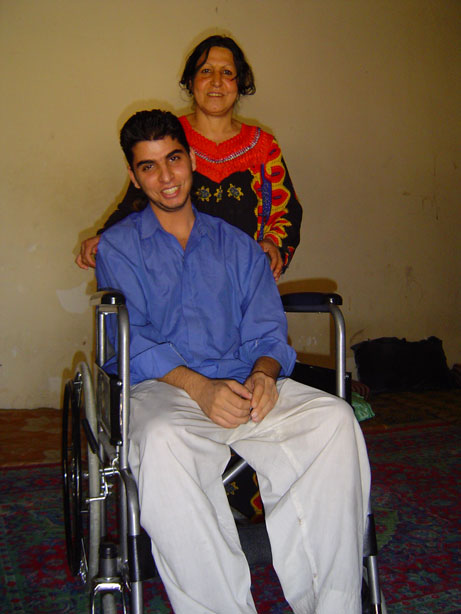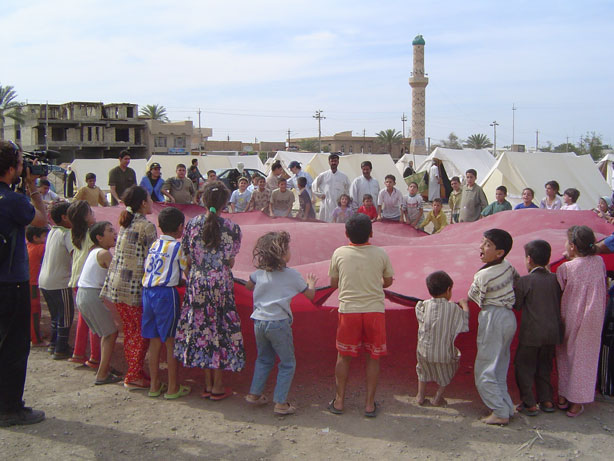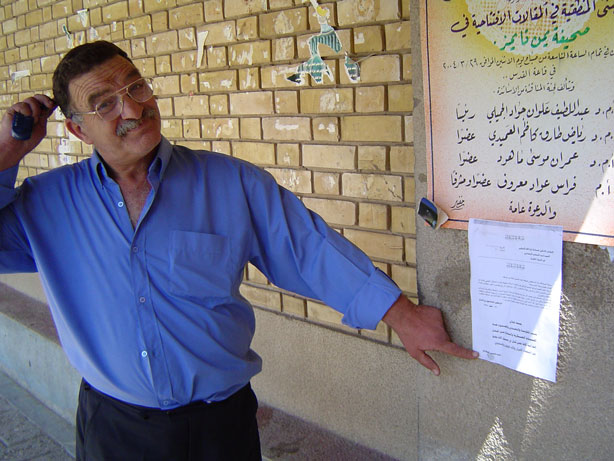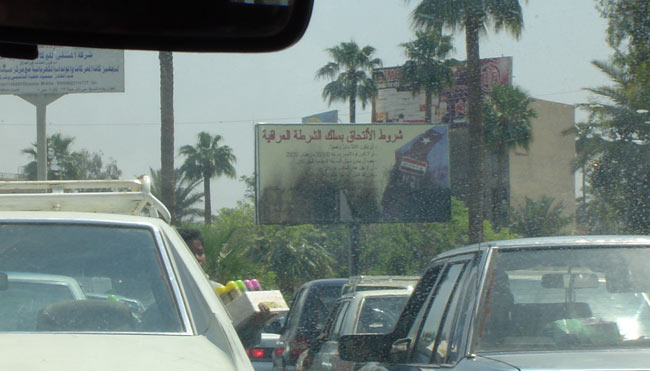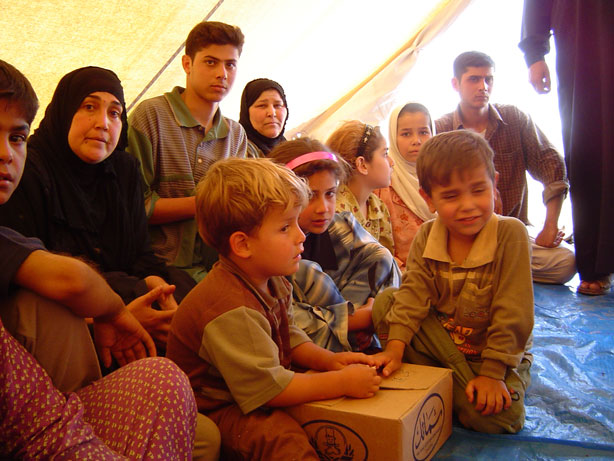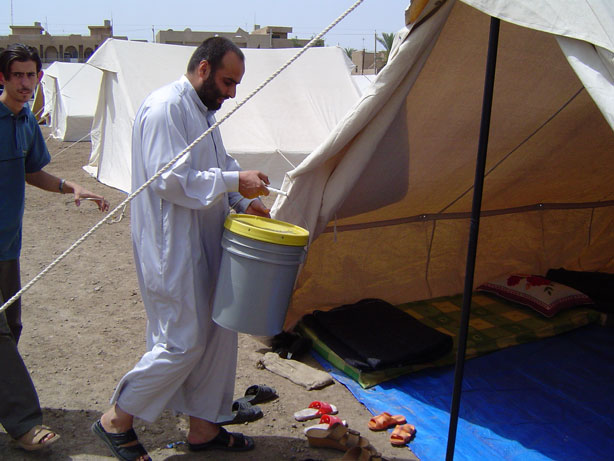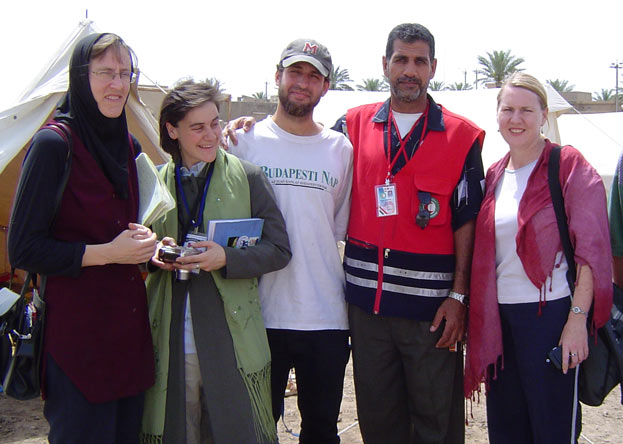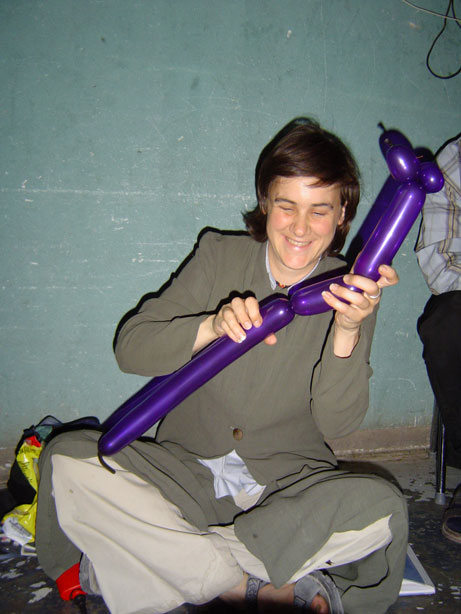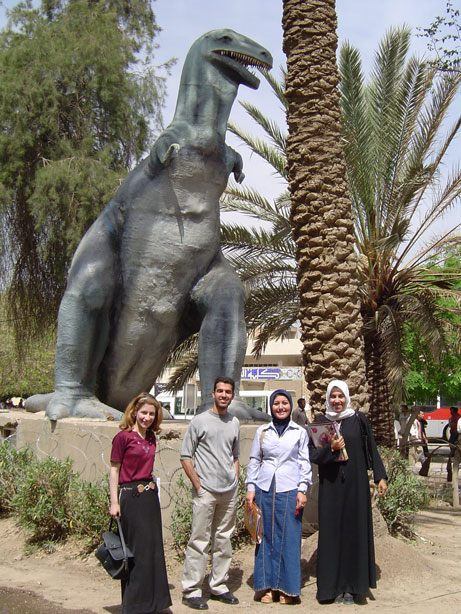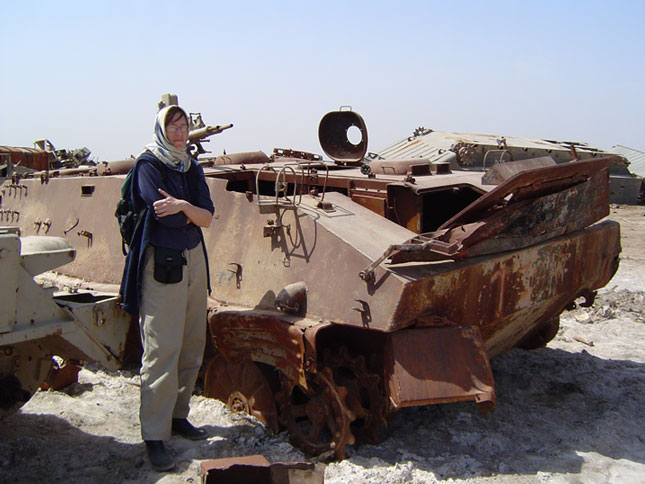I’ve spent the last week bouncing back and forth between refugee camps and the University. With all the fighting in Fallujah, many families have fled the city and come to Baghdad. Most are housed in private homes, but the Red Crescent Society has set up a tent camp inside the city in an area called Ghadaa and there is also a bomb shelter housing many families that I was able to visit. We’ve gone several times to play games with the kids, interview the families, deliver toys and on one occasion, in the words of my British friend Jo Wilding, I came along for a “knickers” delivery to the woman at the shelter. Many told us stories of the kinds of “collateral damage” that are occurring inside Fallujah, with women, children, and the elderly being injured or killed. Anyone who ventured out of their home to look for food was at risk of being targeted. Two of the families at the shelter told us that ambulances were being shot at, which matched two different eye-witness accounts by human rights workers. They also told us that a private hospital had been bombed and the government hospital near the bridge was surrounded by Americans so no one could go near it. The only one bringing aid in, according to one family we talked to, was the Mujahedeen.
Over the past week, the fighting in Fallujah intensified and in one of the daily press conference held every afternoon (which some friends call the Five o’clock Follies) General Kimmitt was asked why didn’t the American troops just pull out of Fallujah? People have been asking this question for days and finally last night Kimmitt responded by saying that the only security being offered to the people of Fallujah is being provided by the Americans in the Coalition-controlled areas of the town. To pull back would be to give Fallujah back to the insurgents (and by this he means mostly Baathist and foreign fighters despite the fact that most of the evidence indicates that a large part of the resistance is indigenous and tribal ... these are local people fighting for their town). In this, is the root of the problem, to pull out is viewed as a humiliating defeat for the Americans and a win for the insurgents. That seems to be unconscionable to people the military minds that are running this campaign in Fallujah. So much of this war is wrapped up in a pathological desire to never lose face. Winning should not be about who is left standing at the end. It should be about who protects the most lives. These people, and I would include both the Americans and the insurgents in this statement, are operating at the level of the kindergarten sandbox.
In the midst of all this I’m still teaching English to students at the University of Baghdad and on April 21st I gave my students a written exam (incidentally my most interesting reason from a student about why he had missed the test was that he had been delayed at an American checkpoint. I toyed with the idea of telling him, “Oh yeah, right! I’ve heard that one before!”). I’m new to this teaching thing and so it didn’t occur to me how long it would take me to actually grade a test that was filled with mostly essay-type questions (somewhere in the range of 15 hours). Much of the time I spent complaining about how they don’t pay me enough for this job (they talk of giving me something in the range of 2000 Iraqi Dinars per lecture … I have four lectures per day, two days a week so I would, in theory, rakes in a whopping $11 each week … If I ever end up seeing any of this money I will probably just donate it to their book fund).
To make the test a little more interesting, I decided to ask the students questions about pictures that I had selected from their lives here in Iraq. I placed a picture of Paul Bremer, the U.S. ambassador to Iraq, and a picture of some Iraqi police on the test. Imagine my surprise after reading approximately 30 tests that stated that “Boll Bemir is the ruller of Iraq,” … I came upon two tests where the students added notes taking me to task for choosing to use such pictures.
“Why did you do this? I like you but this was wrong. Please don’t this again!”
I have approximately 120 students and only two actually complained about this but I decided to apologize for stepping on anyone’s toes and I explained my reasoning for using the pictures.
“First off,” I told them, “I wanted these pictures to mean something to you. It would be fine in American to include current events and prominent figures on school tests and exercises.”
“Secondly,” I said, “I also really wanted to know what you think about these pictures. I am here in Iraq to learn and though I am your teacher, I want to learn from you as well.”
“Finally,” I concluded, “I recognize that in the past, you would not have been able to speak freely about such subjects, but I want you to know that whatever you said about these pictures, whether it was good or bad, I don’t care. All I cared about is that you did so in complete and proper sentences!”
The students seemed to be reasonably satisfied with my explanation and after receiving their graded tests they still, despite the fact that I come from the occupying nation, seem to like and respect me. I wonder if any other teacher has had the pleasure and yet also the challenges of working in similar circumstances?
